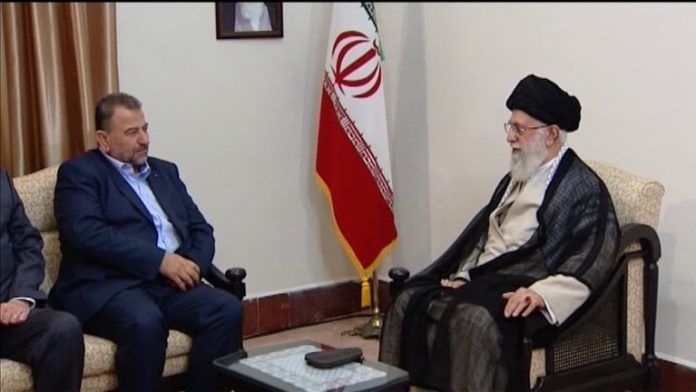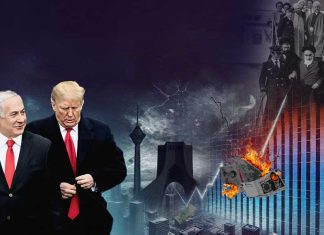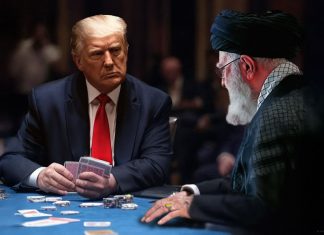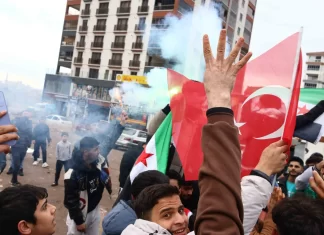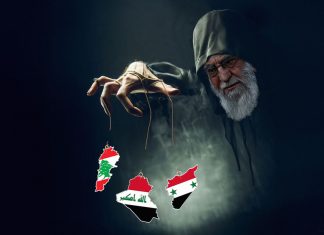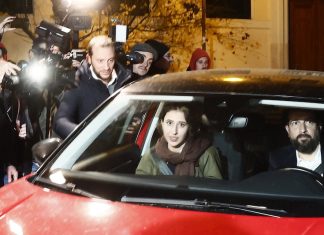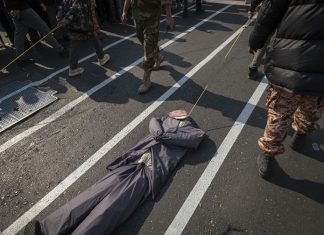By Ahmad Rafat
The unfolding tragedy in Israel and the Gaza Strip shows just how quickly the Middle East can combust in the flames of war. It also makes clear that ordinary people are paying a heavy price for the failure of the principal players in the region to resolve the current crisis.
Meanwhile, some regional players like the Islamic Republic of Iran are looking for opportunities to further their goals by transforming the crisis into a deadly conflict.
Palestinians living in the Old City of Jerusalem poured into the streets in protest after Israeli police entered the Al-Aqsa Mosque, the third holiest site in Islam. Clashes between Palestinians and Israeli police quickly spread to other cities. Many Israeli Arabs joined in.
The protests would have probably ended after a few days if Iran-backed terrorist groups Hamas and the Palestinian Islamic Jihad (PIJ) had not attacked Israel with some 2,000 rockets and missiles.
Iran provides military and financial support to Hamas and the PIJ, operating in the Gaza Strip. The tensions in Jerusalem de-escalated when war broke out between these two groups and the Israeli military.
Tehran has been providing military and financial support to Hamas and the PIJ for years. Yet this time, a political leader of Hamas, Ismael Haniyeh, and the spokesperson for the PIJ, Abu Hamza, appeared on TV and openly thanked the Islamic Republic for sending money and missiles to the Gaza Strip. In a recently published video clip, Mr. Haniyeh said that the military and financial help to Gaza was part of Iran’s strategy to strengthen the “Axis of Resistance.”
[aesop_image img=”https://kayhanlife.com/wp-content/uploads/2018/03/Capture-60.png” panorama=”off” credit=”FILE PHOTO: A display featuring missiles and a portrait of Iran’s Supreme Leader Ayatollah Ali Khamenei is seen at Baharestan Square in Tehran, Iran. REUTERS./” align=”center” lightbox=”on” captionsrc=”custom” captionposition=”left” revealfx=”off” overlay_revealfx=”off”]
[aesop_image img=”https://kayhanlife.com/wp-content/uploads/2021/05/2021-05-07T085939Z_668753611_RC2WAN9QTYI5_RTRMADP_3_IRAN-QUDS-RALLY-scaled.jpg” panorama=”off” credit=”Regime backed groups burn an Israeli flag during a rally marking the annual Quds Day, or Jerusalem Day, in Tehran, Iran May 7, 2021. REUTERS./ ” align=”center” lightbox=”on” captionsrc=”custom” captionposition=”left” revealfx=”off” overlay_revealfx=”off”]
In other words, Iranian officials are no longer keeping their support for Hamas and the PIJ secret.
The commander of the Islamic Revolutionary Guards Corps (IRGC), Major General Hossein Salami, recently said that Israel would be dealt the final blow.
Brigadier General Ismael Ghaani, the commander of the IRGC’s Qods Force (IRGC-QF), a division responsible for extraterritorial military and clandestine operations, pledged Tehran’s support for Hamas in a telephone conversation with the organization’s leader Ismael Haniyeh.
Ali Akbar Velayati, an advisor to Iran’s Supreme Leader Ayatollah Ali Khamenei on international relations, has told Ziyad al-Nakhalah, the leader of the PIJ, in a phone conversation: “God willing, we will hold a prayer soon in Qods [Jerusalem], led by the supreme leader.”
[aesop_image img=”https://kayhanlife.com/wp-content/uploads/2019/03/2016-05-05T120000Z_2033216091_S1BETCHAJEAA_RTRMADP_3_MIDEAST-CRISIS-LEBANON-IRAN.jpg” panorama=”off” credit=”FILE PHOTO: Ali Akbar Velayati talks with Lebanon’s Hezbollah deputy leader Sheikh Naim Qassem during a conference in Beirut.Ali Akbar Velayati (R), Iran’s Supreme Leader Ayatollah Ali Khamenei’s top advisor on international affairs. REUTERS/Aziz Taher” align=”center” lightbox=”on” captionsrc=”custom” captionposition=”left” revealfx=”off” overlay_revealfx=”off”]
Why do leaders of the Islamic Republic, Hamas, and the PIJ speak so openly about Tehran’s financial and military support to those organizations? What is Iran hoping to gain by fueling war between Israel and Gaza? How can Iran use the current crisis to its advantage?
The answers to these questions could shed some light on the reasons behind the escalation of the current war.
Iran became isolated after the signing of the Abraham Accords, a joint statement reached in August between Israel, the United Arab Emirates (UAE), and the US. A decision by several Arab countries to recognize the state of Israel formally and strengthen their diplomatic and economic ties — as well as, potentially, their security and military cooperation — has diminished Iran’s power and influence in the region significantly.
The current hostilities between Israel and Gaza has allowed Iran to put these Arab countries in a difficult position. They cannot continue to develop their ties with Israel as they have done in the past few months.
The Arab states of the Persian Gulf got access to sensitive security information after developing closer relations with Israel, giving them a clear advantage over Iran.
Now, by supporting the Palestinians, the Islamic Republic can arguably reclaim some of the power and influence it lost in recent years among Arab countries and the wider Islamic world. The measure can also give Iran an advantage over its regional rivals, particularly Saudi Arabia.
Palestine and the city of Jerusalem, known as Beit ol-Moqaddas (the holy city) in the Islamic world, hold particular importance for Muslims. Its support for the Palestinians in the current war can undoubtedly strengthen Iran’s standing in the Muslim world, given its regional rivals’ lack of decisive response to the conflict.
[aesop_image img=”https://kayhanlife.com/wp-content/uploads/2019/01/israel-0984392-flag-r54.jpg” panorama=”off” credit=”An Israeli flag is seen near the Dome of the Rock, located in Jerusalem’s Old City on the compound known to Muslims as Noble Sanctuary and to Jews as Temple Mount December 6, 2017. REUTERS/Ammar Awad” align=”center” lightbox=”on” captionsrc=”custom” captionposition=”left” revealfx=”off” overlay_revealfx=”off”]
Iran’s other goal is to influence the election in the Palestinian territories, which was initially planned for June but has now been postponed.
Since its inception, the Islamic Republic has considered the destruction of Israel as one of the primary goals of its foreign policy. Therefore, it cannot tolerate those Palestinians who have frequently engaged in talks with Israel and continue to promote the two-state solution to the conflict to win in the elections.
By assuming the heroic role of the defender of the Palestinian rights, Hamas would undoubtedly reduce support for the Fatah Party and its leader Mahmoud Abbas, who is the President of the Palestinian Authority.
Recent attacks by Hamas and the PIJ could give Iran and its allies a chance to assess Israel’s anti-missile defense system, known as the Iron Dome, since many people believe that a direct military conflict between Iran and Israel is entirely plausible. The war has shown that the Iron Dome can detect and destroy about 90 percent of missiles and rockets if dozens are fired simultaneously. The other 10 percent reach their targets.
There could also be a connection between the Islamic Republic’s efforts to fuel the war and its engagement in the ongoing indirect talks with the U.S. in Vienna, Austria, on reviving the Joint Comprehensive Plan of Action (JCPOA), better known as the Iran nuclear deal.
Tehran hopes that the new administration in Washington would lift the crippling economic sanctions imposed on Iran by the former U.S. President Donald Trump. The tough sanctions have brought the ailing Iranian economy to the brink of complete collapse.
While those involved in the Vienna talks remain optimistic, the negotiations have encountered many obstacles that cannot be easily overcome.
Iran has called for the lifting of all sanctions that have prevented its oil and gas sale. It has also demanded the release of its frozen assets. However, U.S. President Joe Biden’s administration cannot oblige these demands easily.
Tehran dispatched Iranian Foreign Minister Mohammad Javad Zarif to the European capitals recently, hoping to exploit the current crisis to resolve the deadlock in the Vienna talks.
In his meetings with European officials, whose efforts to broker a ceasefire between Israeli and Palestinians have failed so far, Mr. Zarif has said openly that the Islamic Republic holds the key to ending the war and resolving the crisis. To end the war swiftly, the West and the Europeans must convince the U.S. to lift all economic sanctions, allowing Iran to sell its oil and gas on the international market; otherwise, the war will continue.
Iran Uses Terrorism to Place Pressure on the Biden Administration
The Islamic Republic does not care how many Israelis and Palestinians die in the war or how much damage Israeli fighter jets could inflict in Gaza.
Not only do those in the West worry about the consequences of war, but so do many Israeli analysts — which is the thrust of Zarif’s argument in his discussions with European countries.
Avi Issacharov, an Israeli journalist for Times of Israel, recently wrote: “While Israel is seeking and achieving tactical successes-such as the air assault on Hamas’s ‘metro’ network of tunnels across northern Gaza, the toppling of high — rise blocs of Hamas significance, and strikes at weapons stores and rocket launchers — Hamas is achieving strategic success, attaining primacy in the Palestinian, Arab and even Israeli spheres.”

